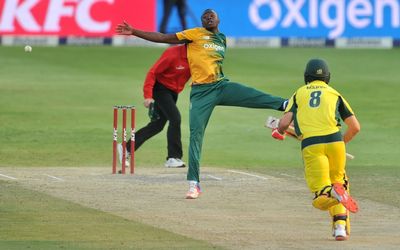Wobbly bowlers will need to adapt, says coach
by Telford Vice,
2016-03-08 05:00:00.0
THAT SA’s bowlers have won games with bat as well as ball this season cut no ice with Charl Langeveldt in the wake of their wobble at the Wanderers in the second Twenty20 against Australia on Sunday.
The Aussies needed 11 runs in the last over to pass SA’s total of 204/7. They scored them with the help of two wides by Kagiso Rabada and three errors in the field.
"If you want to win a World Cup you need to able to defend 200," SA bowling coach Langeveldt said.
"We didn’t pull it through, we had a lot of ifs and buts. But, we need to win games like that. If you want to become a championship team, you need to adapt."
Disappointed though the Proteas were with the result and the way they faltered under pressure, Sunday’s loss set up a decider at Newlands on Wednesday.
Not that Aaron Phangiso will be thinking of how he might help SA win it. Instead, the left-arm spinner will be on tenterhooks to discover if the second round of testing he completed after being reported for a suspect action delivers a different result than the first — that all his deliveries are illegal.
All will be revealed on Wednesday. If the original results don’t change, Phangiso will not be on the plane on Thursday when SA leave for the World T20 in India.
"He’s a strong character," Langeveldt said. "A lot has happened in his life and he’s come back from all of those situations."
The series is being played in the looming shadow of the WT20. Winning the rubber matters, but so does ensuring players are properly primed for the subcontinental playing environment.
"A series win is important for us, especially against a team like Australia," Langeveldt said. "But, we’re also trying to execute our skills in (Asian) conditions.
"So, maybe bowl a wide yorker or a wide slower ball. You don’t want to go into the hitting zones in India where the straight boundaries are a lot shorter."
Which could explain why Rabada looked at Faf du Plessis as if he had been ordered to set his hair on fire when the two talked tactics after the fast bowler had shattered David Warner’s stumps with the first delivery of that fateful final over on Sunday.
Then Rilee Rossouw ran onto the field from the dugout to join the conversation.
Two wides in the next three balls and clumsy fielding and throwing when it mattered most decided the issue.
What were Rabada’s instructions and who issued them?
"That’s up to KG and the captain to answer," Langeveldt said.
But he hoped an important lesson had been learnt.
"We try and encourage the guys to think out of the box sometimes," Langeveldt said. "If you thought out of the box and it didn’t work, you shouldn’t do the same thing (on Wednesday). If he landed those two balls, it would have been game over. It’s about centimetres — if you don’t get it right, you lose the game."
The bigger picture is that Sunday’s loss was SA’s first in seven games in the shorter formats.
And several of those matches have been decided in white-knuckle moments.
"It used to be the case that an individual would change the game," Langeveldt said. "Now we’ve got four or five guys who have won games for us with the bat or with the ball."

MISSED IT: Kagiso Rabada tries in vain to stop the ball as Mitchell Marsh sets off for the winning runs at the Wanderers off the final ball of the match on Sunday. The decider is at Newlands on Wednesday. Picture: BACKPAGEPIX
THAT SA’s bowlers have won games with bat as well as ball this season cut no ice with Charl Langeveldt in the wake of their wobble at the Wanderers in the second Twenty20 against Australia on Sunday.
The Aussies needed 11 runs in the last over to pass SA’s total of 204/7. They scored them with the help of two wides by Kagiso Rabada and three errors in the field.
"If you want to win a World Cup you need to able to defend 200," SA bowling coach Langeveldt said.
"We didn’t pull it through, we had a lot of ifs and buts. But, we need to win games like that. If you want to become a championship team, you need to adapt."
Disappointed though the Proteas were with the result and the way they faltered under pressure, Sunday’s loss set up a decider at Newlands on Wednesday.
Not that Aaron Phangiso will be thinking of how he might help SA win it. Instead, the left-arm spinner will be on tenterhooks to discover if the second round of testing he completed after being reported for a suspect action delivers a different result than the first — that all his deliveries are illegal.
All will be revealed on Wednesday. If the original results don’t change, Phangiso will not be on the plane on Thursday when SA leave for the World T20 in India.
"He’s a strong character," Langeveldt said. "A lot has happened in his life and he’s come back from all of those situations."
The series is being played in the looming shadow of the WT20. Winning the rubber matters, but so does ensuring players are properly primed for the subcontinental playing environment.
"A series win is important for us, especially against a team like Australia," Langeveldt said. "But, we’re also trying to execute our skills in (Asian) conditions.
"So, maybe bowl a wide yorker or a wide slower ball. You don’t want to go into the hitting zones in India where the straight boundaries are a lot shorter."
Which could explain why Rabada looked at Faf du Plessis as if he had been ordered to set his hair on fire when the two talked tactics after the fast bowler had shattered David Warner’s stumps with the first delivery of that fateful final over on Sunday.
Then Rilee Rossouw ran onto the field from the dugout to join the conversation.
Two wides in the next three balls and clumsy fielding and throwing when it mattered most decided the issue.
What were Rabada’s instructions and who issued them?
"That’s up to KG and the captain to answer," Langeveldt said.
But he hoped an important lesson had been learnt.
"We try and encourage the guys to think out of the box sometimes," Langeveldt said. "If you thought out of the box and it didn’t work, you shouldn’t do the same thing (on Wednesday). If he landed those two balls, it would have been game over. It’s about centimetres — if you don’t get it right, you lose the game."
The bigger picture is that Sunday’s loss was SA’s first in seven games in the shorter formats.
And several of those matches have been decided in white-knuckle moments.
"It used to be the case that an individual would change the game," Langeveldt said. "Now we’ve got four or five guys who have won games for us with the bat or with the ball."




















Change: -1.46%
Change: -1.32%
Change: -1.02%
Change: -1.11%
Change: -3.27%
Data supplied by Profile Data
Change: 0.34%
Change: 0.21%
Change: -1.46%
Change: 0.00%
Change: 0.51%
Data supplied by Profile Data
Change: 0.11%
Change: 0.10%
Change: 0.05%
Change: 0.30%
Change: -0.11%
Data supplied by Profile Data
Change: 0.03%
Change: 0.10%
Change: 0.00%
Change: 0.00%
Change: 0.39%
Data supplied by Profile Data